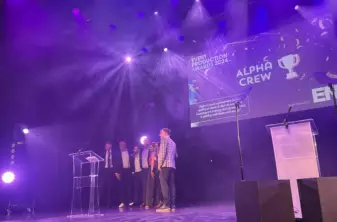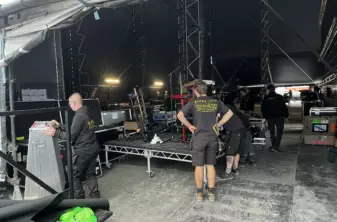Historic Sporting Events - How These Events Shaped the Future of Event Staffing

Global sporting events are not only milestones for the athletes, teams and countries involved, but also for the events industry. Major spectacles like the Olympics and World Cup, push the boundaries of what is possible - and the ripple effects of this are felt in our industry for years. In this blog we’ll explore how events like these have shaped the future of event operations.
The London 2012 Olympics
London hosted the Summer Olympic Games for the third time in July and August 2012. It was an enormous undertaking and a widely celebrated success, viewed globally both in person and via international broadcast.
To pull it off, a vast workforce was needed - and one of the standout initiatives was the ‘Games Makers’ programme: a massive volunteer drive designed to support every aspect of the Games. Volunteers helped with everything from welcoming spectators and managing crowd flow, to assisting athletes and supporting behind-the-scenes logistics.
Applicants went through a formal selection process, and those chosen received bespoke uniforms and in-depth training. These volunteers were widely praised for their enthusiasm, professionalism, and contribution to the overall experience of the Games.
The success of the Games Makers raised expectations around volunteer management at major events. It demonstrated that, with the right structure and support, volunteer roles could be skilled, respected, and central to delivering high-quality experiences. The initiative went on to inspire similar programmes at other international events and left a lasting legacy on how event staff - paid or unpaid - are recruited, trained, and managed.
Qatar 2022 World Cup
Between November and December 2022, Qatar hosted the FIFA World Cup - an event that redefined security planning for stadiums and public spaces. It featured one of the most comprehensive security operations ever seen at a sporting event, incorporating international collaboration, advanced surveillance technology, and crowd monitoring systems to safely manage millions of football fans.
Staff were also trained extensively in local cultural norms and expectations, ensuring respectful and informed interactions with visitors from around the world in a region known for its stricter social codes. In addition, facial recognition technology and mobile ticketing played a pivotal role in streamlining operations and improving the overall guest experience. An estimated 15,000 facial recognition cameras were used across eight stadiums - enhancing both efficiency and security.
Super Bowl
The Super Bowl is an annual pressure cooker - every year is an opportunity to push boundaries in events. Their impressive innovation in crowd control and transport has given us valuable lessons in moving large crowds smoothly with minimal disruption. In addition, private security partnerships have exemplified the power of blending both public and private sector teams. The staff specialisation has led to the rise of niche rolls, such as VIP escorts, tech troubleshooters and fan engagement teams. Each year the Super Bowl production team outdo themselves by pulling off a hugely successful and inspirational event under a global spotlight.
The Evolution of Security Post-Major Events
Unfortunately, previous tragedies have often ended up being catalysts for change in the world of event security. The Boston Marathon bombing led to a great uptick in events tightening their protocols. Disasters like these have led to a growth of background checks, and multi-layered accreditation systems. They have also reinforced the importance of visible vs invisible security, and the strategic placement of staff and tech driven monitoring.
A Lasting Impact
To move forward, we have to look back. By learning from both the successes and challenges of past events, we can continue to improve every aspect of the events industry - from planning and logistics to staffing and on-the-ground execution.
Tech-driven staffing has opened the door to app-based scheduling, digital check-ins, and real-time communication. Logistics have become smarter, informed by past models for transport systems, crowd flow, and access point management. There’s also been a growing emphasis on the staff experience, with increased attention on fair breaks, manageable hours, and upskilling opportunities that support long-term career development. Events like the Olympics, Super Bowls, and World Cups have played a pivotal role in shaping today’s event staffing standards - especially for large-scale, high-pressure environments.
Successful event staffing today is a blend of past lessons and future-focused innovation. As an industry, we must continue to learn from these landmark moments and use them to drive progress - together.


